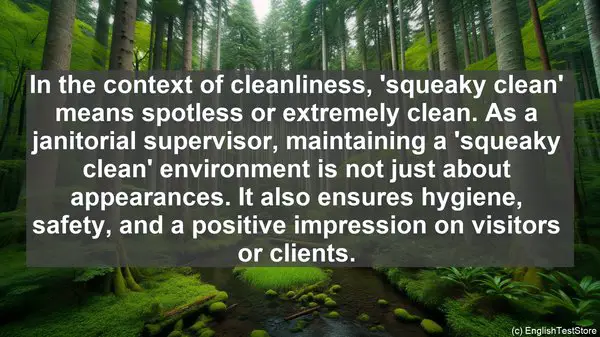Introduction: The Power of Idioms
Welcome to today’s lesson . Idioms are like hidden treasures in a language. They add color, depth, and cultural context to our conversations. For janitorial supervisors, mastering idioms can be especially beneficial. It not only enhances your language skills but also helps you connect with your team and understand their concerns better.

1. ‘Mop the Floor with Someone’
This idiom means to defeat someone decisively. As a janitorial supervisor, you might face challenges or conflicts. When you ‘mop the floor with someone,’ you’re not literally cleaning, but rather showing your superiority or winning an argument convincingly.
2. ‘Sweep Under the Rug’
Imagine you come across a mistake or an issue. ‘Sweeping it under the rug’ means to ignore or hide it instead of addressing it. As a supervisor, it’s crucial to encourage transparency and open communication, rather than letting problems go unnoticed.
3. ‘Clean Slate’
We often use this idiom when we want to start fresh, without any past issues or conflicts. In a team, a ‘clean slate’ approach can be helpful after a disagreement or when implementing new strategies. It signifies a fresh start and a chance for everyone to contribute positively.
4. ‘Dust Settle’
When there’s chaos or confusion, we say ‘let the dust settle.’ It means to wait for things to calm down and become clear. As a supervisor, there might be instances where you need to make decisions, but it’s wise to let the ‘dust settle’ first, ensuring you have all the necessary information.
5. ‘Polish Your Skills’
This idiom is about continuous improvement. Just like polishing an object makes it shine, ‘polishing your skills’ means refining and enhancing your abilities. As a janitorial supervisor, staying updated with industry trends, attending workshops, or seeking feedback are all ways to ‘polish your skills.’
6. ‘Squeaky Clean’
In the context of cleanliness, ‘squeaky clean’ means spotless or extremely clean. As a janitorial supervisor, maintaining a ‘squeaky clean’ environment is not just about appearances. It also ensures hygiene, safety, and a positive impression on visitors or clients.
7. ‘In the Trenches’
When you’re ‘in the trenches,’ it means you’re actively involved in the day-to-day tasks or challenges. As a supervisor, it’s essential to lead by example, not just by giving instructions from a distance. Being ‘in the trenches’ shows your commitment and willingness to work alongside your team.
8. ‘Broom Closet’
This idiom is used metaphorically to refer to a small, hidden, or insignificant place. As a janitorial supervisor, you might come across situations or issues that others might consider ‘broom closet’ problems. However, it’s crucial to give attention to even the seemingly small matters, as they can have a larger impact.

9. ‘Janitorial Diplomacy’
In any workplace, conflicts or disagreements are inevitable. ‘Janitorial diplomacy’ refers to the skill of resolving such issues tactfully and maintaining harmony. As a supervisor, your ‘janitorial diplomacy’ can prevent escalations and foster a positive work environment.
10. ‘Sweeping Changes’
When we talk about ‘sweeping changes,’ it means significant, wide-ranging transformations. As a janitorial supervisor, there might be instances where you need to implement ‘sweeping changes’ in processes, equipment, or even team structure. It’s crucial to plan and communicate these changes effectively to ensure a smooth transition.
Conclusion: The Language of Leadership
Language is not just about words; it’s about understanding the nuances, the idioms, and the cultural references. As a janitorial supervisor, mastering these idioms not only makes you a better communicator but also a more effective leader. So, embrace the richness of the English language, and let it guide you in your professional journey. Thank you for watching!
